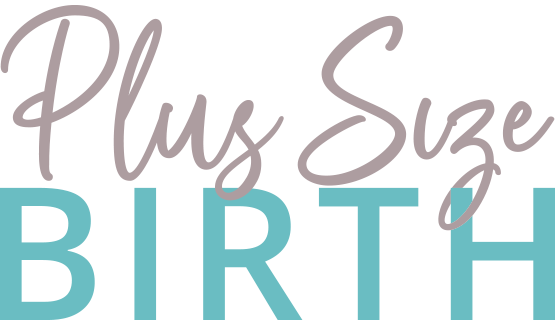Miscarriage and self-blame often walk hand in hand, complicating the healing journey during such a difficult time.
For those in larger bodies, the societal stigma around weight can add unnecessary guilt to the grieving process. This additional burden complicates healing, often making it harder to move forward.
Weight frequently emerges as an unwarranted focus of blame following a loss, even though the reasons behind miscarriages are varied, complex, and often unknown.
Let's take a collective, healing breath and dismantle these intricate webs of guilt together.
A Miscarriage and Self-Blame Story
As a certified childbirth educator, I've had the privilege of standing alongside many individuals in the aftermath of pregnancy loss.
Grief is not one-size-fits-all.
For some, it's a quiet, private journey, while others grapple with intense feelings of emptiness and sorrow.
There's no right or wrong way to experience a miscarriage; every emotion is valid. That's something I want to acknowledge right from the beginning.
My miscarriage and self-blame story began in 2012 when I experienced a first-trimester pregnancy loss.
That loss was a personal heartache and an unforeseen strain on my marriage.
I struggled to communicate my feelings of self-blame and shame, especially about how I believed my weight might've caused my loss. This created a wedge between my husband and me that persisted for years and years.
Plus Mommy Podcast Episode Recommendation: A Dad’s Perspective On Plus Size Pregnancy, Birth, and Miscarriage.
Healing began when I mustered the courage to express my buried feelings and sought professional help.
Therapy was instrumental in helping me navigate through the grief. And I was able to embark on a transformative journey toward self-love and body acceptance.
I want to affirm that however you are coping, your feelings are acknowledged, but it's crucial to understand that the loss you experienced is not your fault.
Below are some strategies that were pivotal in my healing process.
7 Tips for Healing Through Miscarriage as a Plus Size Individual
The silent partnership of miscarriage and self-blame can significantly hinder the natural grieving process. This is particularly true when sharing these inner fears seems impossible.
Here are helpful insights for plus size individuals who have endured a loss and guidance for size-friendly birth professionals seeking to provide resources and support.
1. Recognizing and Releasing Weight-Centric Blame
Plus size individuals often bear the brunt of self-blame, particularly when it comes to miscarriage.
The paramount thing to remember is that your loss was not your fault.
Let this be your mantra, gently reminding yourself that most miscarriages result from complex factors beyond your control, such as chromosomal abnormalities, and not a result of your body size.
While research indicates a correlation between higher Body Mass Index (BMI) and increased miscarriage risk, BMI isn't the sole indicator of health.
In fact, it's quite flawed; just ask the American Medical Association, which recently came out with a statement about how BMI is an imperfect clinical measurement.
And studies typically don't just look at low-risk pregnancies in individuals with higher weights. They generalize findings across different groups, often blending results from those already at high risk before pregnancy.
It's important to note that having a high-risk pregnancy increases the likelihood of miscarriage for individuals of all sizes, not exclusively those of higher weight.
Blaming your weight does not contribute to healing; instead, it fosters further self-loathing, eroding self-esteem, and impeding emotional recovery.
Embracing self-compassion instead of focusing on your weight is essential for nurturing your emotional well-being.
2. Engage in Compassionate Self-Talk
It's normal to feel intense anger and ride the waves of grief, but over time, try to embrace self-talk filled with compassion and understanding.
It might feel weird at first, but try to talk to yourself as kindly as you would to a friend who's hurting.
Forgive your body and allow it to be a vessel of strength, not blame. Speak gently to yourself; if negative thoughts arise, counteract them with kindness and understanding.
Keep doing it; it's essential for healing.
3. Seek Supportive Communities
Surround yourself with people or online communities who understand your journey.
For example, finding a supportive online community, like a Facebook group, can be instrumental in your healing journey after a miscarriage.
Selecting a group that fosters a safe, private, and respectful environment where diverse experiences are shared and active moderators ensure adherence to community guidelines is crucial.
Take the time to observe the group dynamics, and don't hesitate to leave if it doesn't feel like the right fit. The right community will respect your experiences and contribute to your path toward healing and self-acceptance.
When seeking community support, engage in conversations that uplift and avoid spaces perpetuating body negativity or self-blame.
You can also connect with friends or family who've shared their stories of loss. It's surprising how many people have gone through a miscarriage. While it's a club no one wishes to join, it's comforting to know you're not alone.
4. Seek Professional Guidance
If community support doesn't feel like it's helping enough, there's zero shame in seeking professional support for a miscarriage.
Engage with therapists or counselors who can assist you in navigating through miscarriage and self-blame, along with any potential body-image struggles that surface along the way.
Therapists with expertise in perinatal health and pregnancy loss understand the profound impact of such experiences and can offer tailored strategies for processing your emotions.
Also look for those informed by Health at Every Size® (HAES) principles, as they will also approach topics related to weight with sensitivity and understanding, ensuring a supportive healing environment.
To find a specialist, consider searching online mental health professional directories or using resources provided by organizations like Postpartum Support International.
Reach out to prospective therapists to inquire about their experience with pregnancy loss and their commitment to HAES principles. Finding a therapist who respects and understands your journey is crucial, and taking this step is a testament to your resilience.
5. Indulge in Self-Care
Prioritize self-care and embrace activities promoting physical and mental health, like peaceful walks, yoga, or spending time with a good book—whatever genuinely soothes your spirit.
And while you're at it, cultivate a perspective that respects and honors your body for what it is, recognizing its worth and capabilities outside of societal norms and expectations.
Here are helpful body positive stories and resources.
6. Find a Size-Friendly Healthcare Provider
Part of self-care is prioritizing healthcare. And you deserve to work with healthcare professionals who approach your care with understanding, without judgment or bias based on your size.
This is critical for everyone! But especially for those navigating a subsequent pregnancy after a loss, as it can often stir a mix of emotions, including fear of recurrent losses.
You'll want to surround yourself with a supportive healthcare team that acknowledges these fears while providing empathetic, evidence-based care.
If you need help finding a provider who respects your needs, use these tips to locate size-friendly healthcare professionals.
7. Honor Your Loss (if it feels right)
Many individuals draw comfort from acknowledging their loss in a way that holds personal significance. It's important to remember there's no prescribed method to honor a pregnancy loss, and you shouldn't feel compelled to do so unless it resonates with you.
If it feels like a step you want to take, here are some thoughtful suggestions.
Memorial Rituals
Some individuals find solace in holding a private ceremony or creating a memorial space in their home. This could be as simple as lighting a candle, planting a tree or flowers, or setting up a dedicated area with photos, mementos, or comforting items that remind you of your lost one.
Naming Your Baby
Even if your loss was early, naming the child you didn't get to meet can provide a sense of reality, validation, and healing. It acknowledges your baby's existence, no matter how brief, and allows for personal closure.
Get a Tattoo or Piece of Jewelry
Some find solace in having a permanent symbol representing their baby, like a tattoo or a symbol. A piece of jewelry, like a necklace or bracelet, can also be a physical reminder of the love you carry for them.
Writing Letters
Expressing your emotions can help in the healing process. Consider writing a letter to the child you lost, expressing all the love, hopes, and dreams you had for them. This act can be a powerful release of pent-up emotions.
Artistic Expression
Channeling your feelings into art can be therapeutic. Painting, composing music, crafting, photography, or any artistic expression can become tributes to your loss and an outlet for your grief.
Below you'll see a photography example using sparklers to represent a burst of love that faded too quickly, but the memory remains forever captured in this photograph.
Charitable Acts
To commemorate their memory, you might find purpose in making a donation or volunteering for causes that are meaningful to you.
Balloon Release
Some people find closure in having a small ceremony where they release balloons into the sky. This act can symbolize letting go and sending love to wherever your lost one may be.
Joining Remembrance Events
Consider participating in walks, runs, or community gatherings, especially in October, Pregnancy and Infant Loss Awareness Month.
Engaging in these communal remembrances can be a powerful step in your healing journey. Look for events in your local community or search for virtual gatherings online.
These are just a few ideas, but ultimately, do what feels right for you.
And if you have a partner, consider involving them in the process, as it can be a shared path toward healing.
Miscarriage can affect relationships differently, and sometimes, partners grieve differently. Open communication can help both parties understand each other's feelings and provide mutual support. Engaging in counseling together, attending support groups, or simply sharing feelings with one another can be really helpful.
Remember, the path to healing, especially from something as deeply personal and complex as a miscarriage, is neither linear nor universally defined.
So, as you continue your journey of healing and self-compassion, embrace this truth: Your experience is valid. Your grief is acknowledged, and your healing process deserves support.
You're not alone, and your loss was not your fault!
- High BMI Early Gestational Diabetes Test – Is It Really Needed? - April 26, 2024
- Gestational Diabetes Diagnosis: What Now? A Helpful To-Do List! - October 18, 2023
- Navigating Miscarriage and Self-Blame as a Plus-Size Individual - October 16, 2023




